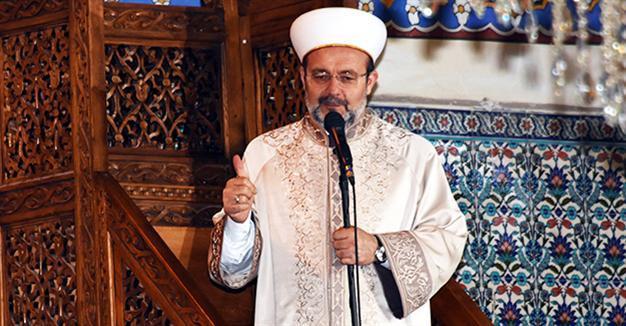Turkey’s top cleric calls for autonomous religious directorate
ANKARA

DHA Photo
Turkey’s top cleric has called for a restructuring of the Directorate of Religious Affairs (Diyanet) in order to make it an “autonomous” body, during work to draft a new constitution, while he also stating that madrasas (Islamic seminaries) in Southeast Anatolia should have legal status in order to avoid exploitation by “terrorist” groups.“During debates on the new constitution, Diyanet should definitely be restructured. In my opinion, getting Diyanet completely out of politics and turning it into an entirely autonomous institution has become an obligation,” Diyanet President Mehmet Görmez told a group of journalists last week.
His remarks delivered en route from southeastern Şırnak province to Ankara on March 4 were released by the state-run Anadolu Agency late on March 7. Görmez accompanied Prime Minister Ahmet Davutoğlu on March 4 during an unannounced visit to Şırnak’s Silopi district, which was scene to a blanket curfew between Dec. 14, 2015, and Jan. 19 as part of operations against militants from the outlawed Kurdistan Workers’ Party (PKK).
“I believe that [for Diyanet] to resume its presence as an autonomous institution in administrative, scientific and religious aspects which has public corporate identity and which can stand on its own feet but which is a constitutional institution will be useful,” Görmez said.
Diyanet was created in 1924 to replace Ottoman Sheikh al-Islam, the mufti with the authority to confirm new sultans who also served as the chief legal adviser. The caliphate itself was abolished in 1924, part of early modernization efforts by Mustafa Kemal Atatürk, who founded the secular Turkish Republic on the ruins of the Ottoman Empire.
Today, Görmez’s department drafts the weekly sermon delivered at the nation’s 85,000 mosques, which it supervises, and more than 2,000 mosques abroad that function under the directorate. It also employs all of Turkey’s imams, who are technically considered civil servants trained by the state.
‘Religious services a matter of security’
“At the moment, looking at our region, religious services are a matter of security. In a world like this, the presence of Diyanet, which fulfills its services in 85,000 mosques in Turkey five times a day and every Friday and conducts all other work, has gradually become more important. Five years later, it will become more important. If we take developments in the region into consideration, 10 years later, we will be more in need of this institution as the country and as the geography. Taking all of these into consideration, I believe that it will be more useful to have the institution able to stand on its own feet and proceed on its way with a more uniting and more surrounding mission by leaving aside suspicions, anxieties and fears,” Görmez said.
“We want the madrasas in the region to have a certain structure with its curriculum, exams and instructors in a legal environment where their inspection would be possible,” he also said. “We witness that otherwise these structures are being exploited by the terror organization,” he added, referring to the PKK. “This should also be spoken very clearly and transparently and should be pondered. It should not be understood as paving the way for a new institution alternative to formal education,” he said.
After the proclamation of the republic in 1923, in addition to the abolishment of the caliphate, a series of reforms were enacted in 1924. The closure of all madrasas, “tekkes” (dervish lodges) and “zaviyes” (small dervish lodges), the closure of the Sharia and Religious Foundations Ministry and placing all educational institutions under the Education Ministry were among these reforms.
















